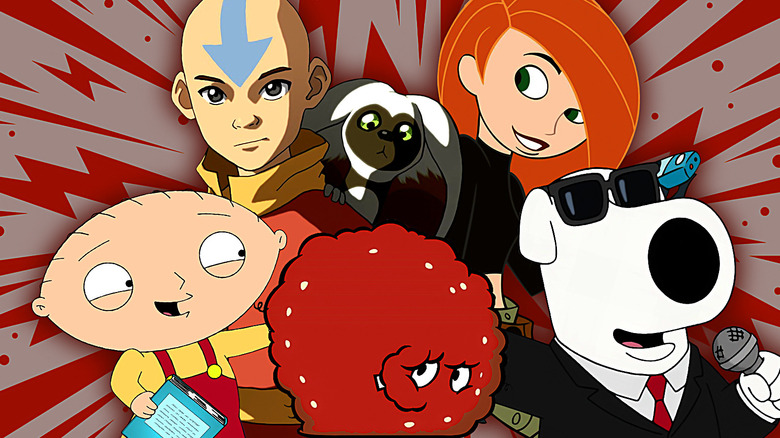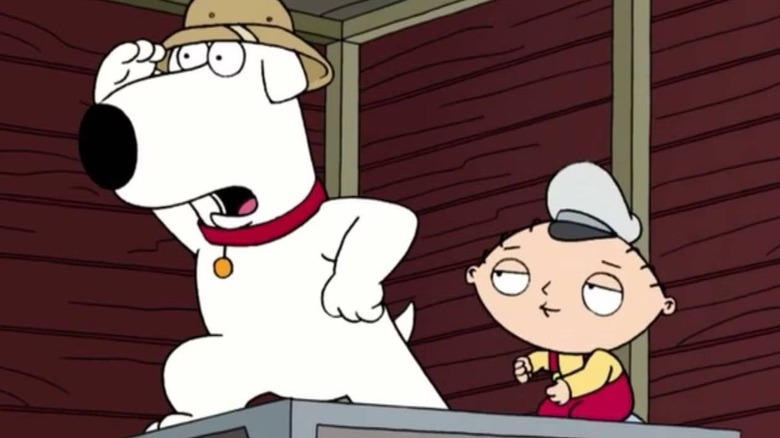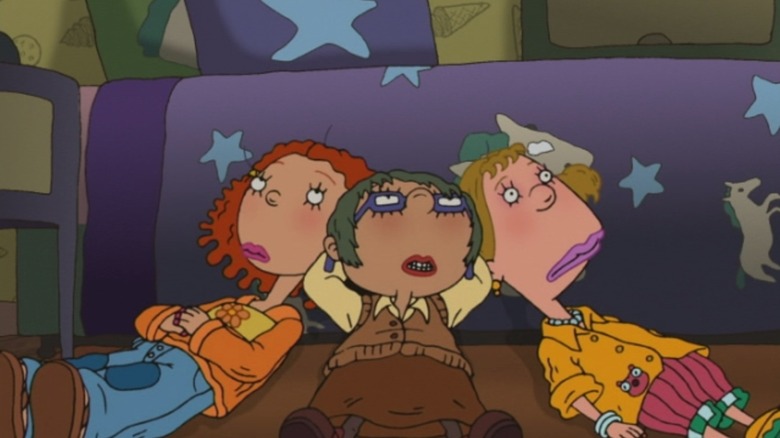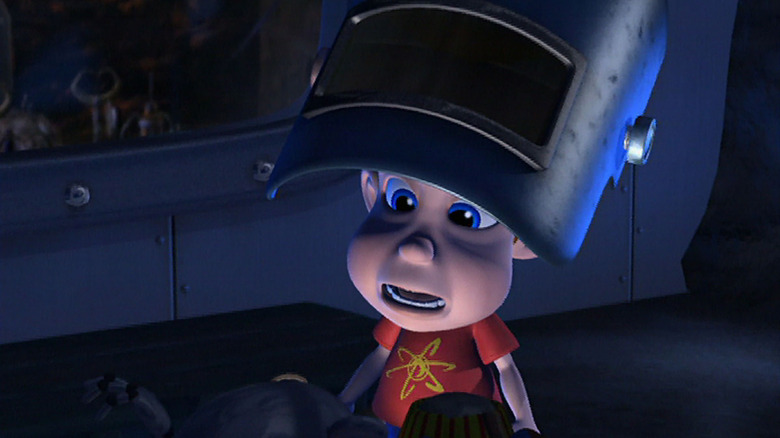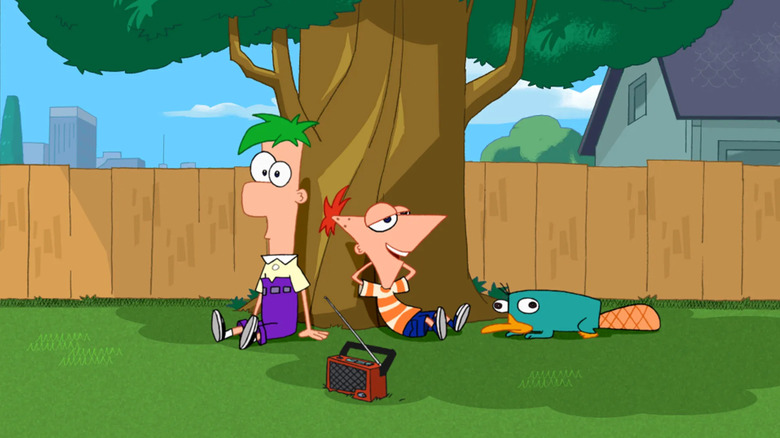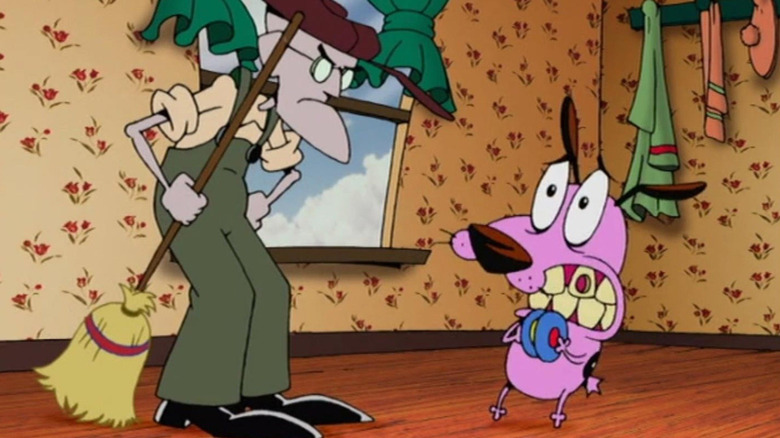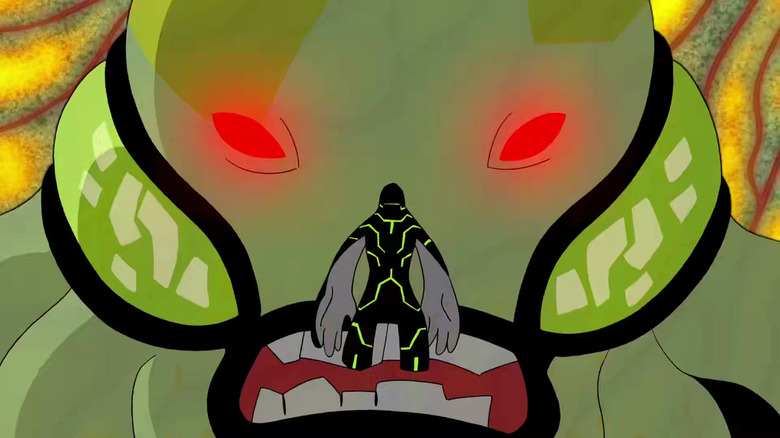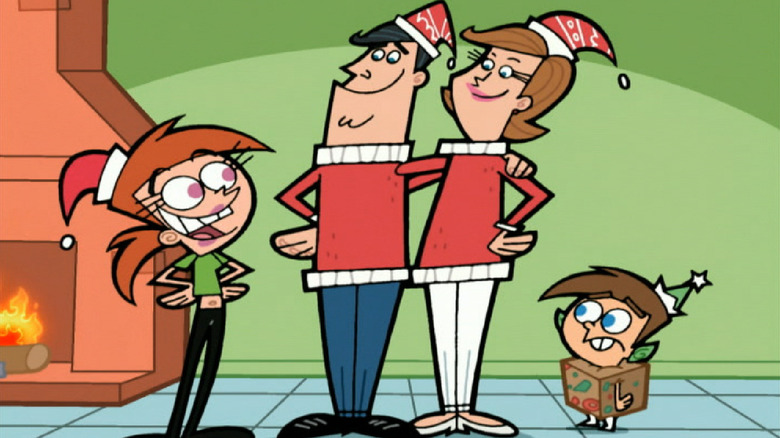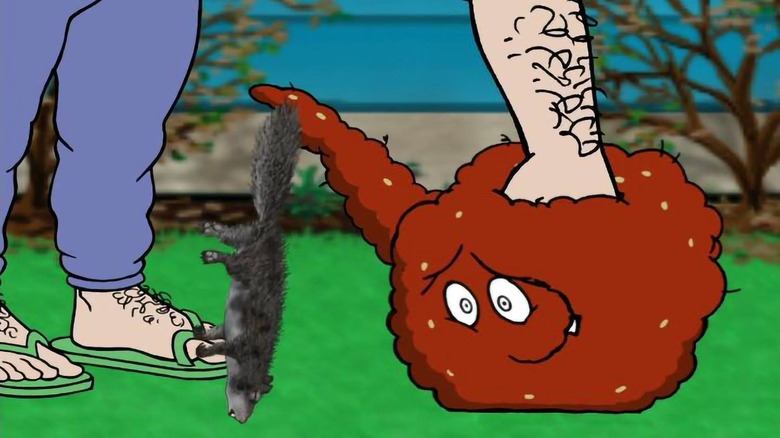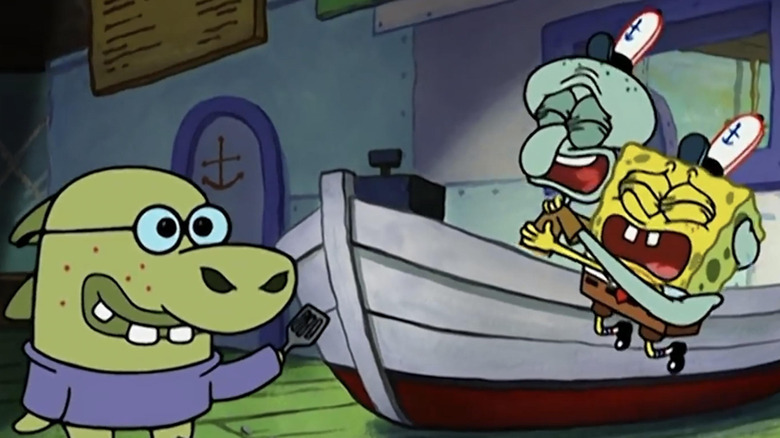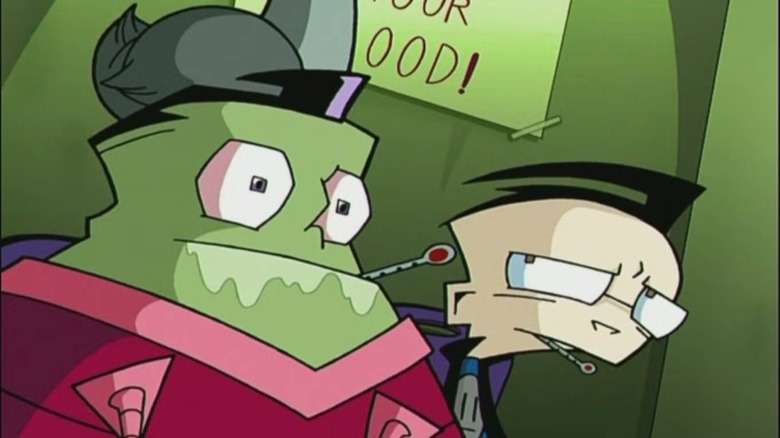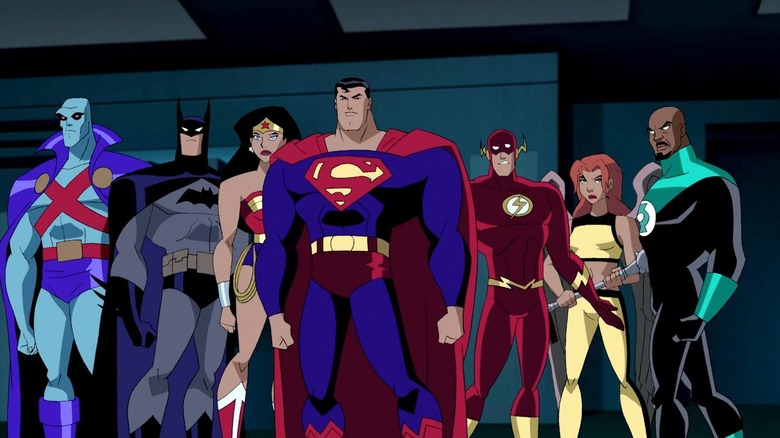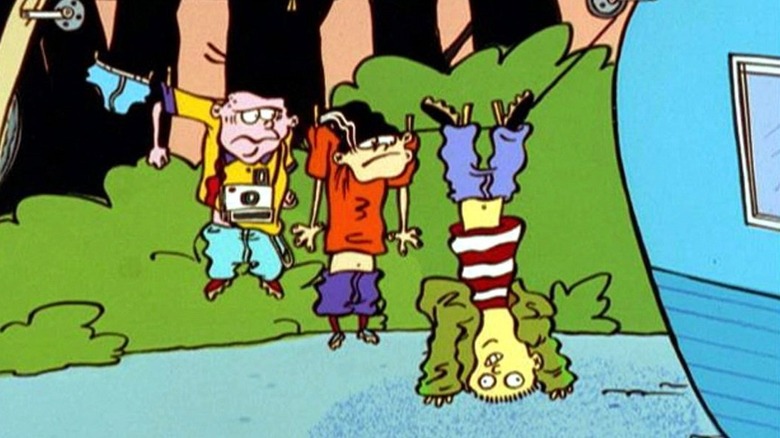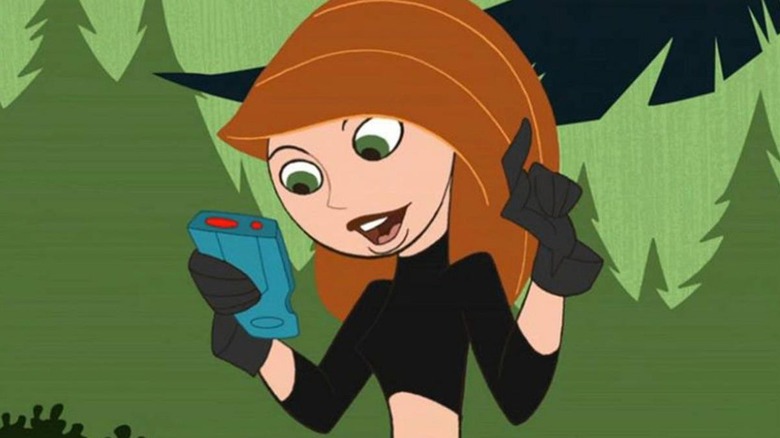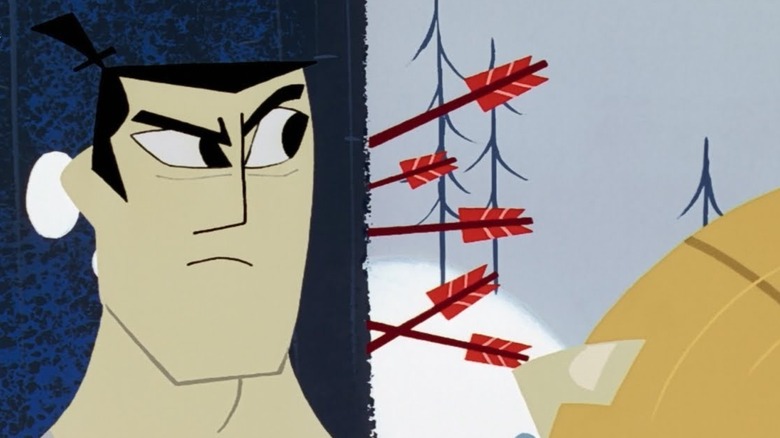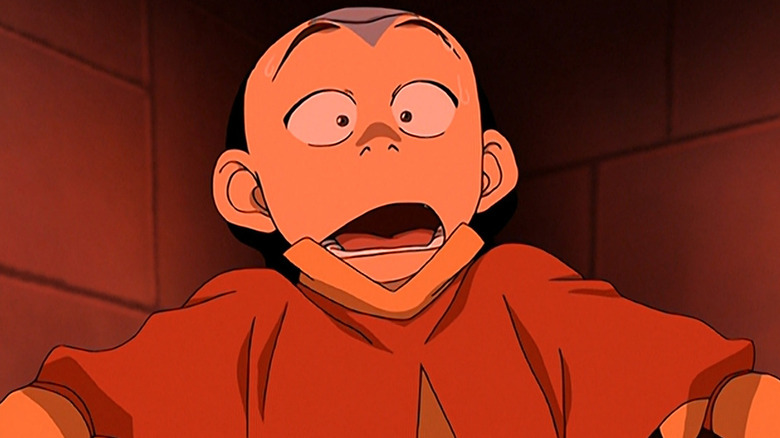The 15 Best 2000s Cartoons, Ranked
The 1990s were a monumental decade for animation. Plenty of kids who came of age during this time fondly remember watching classics of the medium on their television sets while Disney was in the midst of another renaissance with the likes of "Beauty and the Beast" and "The Lion King" gracing the big screen. That quality carried over into the 2000s with plenty of series that still proved animation was something that could be enjoyed by people of all ages.
The best 2000s cartoons primarily consist of those marketed toward kids, but there are a few adult animated shows gracing this list that were for a more (im)mature mindset. The main criteria for this list is that a show needs to have had its best episodes during the years from 2000 to 2009. That means even if something debuted during the '90s or carried over into the 2010s, as long as it had its heyday in the 2000s, it counts here.
The new millennium certainly didn't shortchange us any classics, as there's much nostalgia for all of these properties (even if they're still on the air). See which show made it to the top, and let the debate of which early 2000s cartoons were truly the best begin!
Family Guy
"Family Guy" premiered in January 1999, and the comparisons to "The Simpsons" were almost immediate. That largely stems from the show borrowing from a lot of sitcom tropes, but "Family Guy" quickly differentiated itself with edgier humor and far more non-sequitur jokes. Peter Griffin's misadventures as a dim-witted husband and father, who still had a good heart at least in the early seasons, were a constant source of hilarity, with Stewie and Brian soon emerging as fan-favorites who would frequently go off on their own storylines, like the pair going on a cross-country journey of self-discovery in season 2's "Road to Rhode Island."
The show came back on the brink from cancellation twice, with DVD sales and reruns on Adult Swim proving their was an audience for the raunchy humor. The animated sitcom remains a cornerstone of Fox's programming to this day, and even though "Family Guy" still courts controversy, it gets away with it for being so darn funny. The story of "Family Guy" is one of second chances, but there's no denying those episodes from the early seasons remain some of the best in the show's entire run.
As Told By Ginger
A lot of people tend to think cartoons deal exclusively with wild, out-there concepts and amazing action sequences. That makes it refreshing when one uses the medium as an entry point into telling deeper stories that the targeted audience can relate to. "As Told By Ginger" remains one of the most incredible early 2000s cartoons, as it follows Ginger figuring out her life as a junior high student, with crushes, bullies, and everything else that entails.
The series broke the mold in various ways. The characters got older, and they even changed outfits in every episode (a far cry from wearing the same thing day in, day out as is the case with most cartoons). And "As Told By Ginger" wasn't afraid to tackle extremely dark topics, like in the episode "And She Was Gone" where Ginger writing a depressing poem makes her teacher worried about her safety. There was definitely plenty of humor, too, but ideally, the series allowed those watching to realize they weren't alone in whatever struggles they were going through.
The Adventures of Jimmy Neutron, Boy Genius
By 2000, CGI animation was definitely a thing even if it wasn't standard in the industry yet. "Toy Story" already proved it could be done well, and Nickelodeon ventured into this territory as well with 2001's "Jimmy Neutron: Boy Genius" movie. Obviously, the idea of a child genius whose inventions sometimes run amok had plenty of opportunities for other stories, and 2002 gave Jimmy his very own series.
Many episodes followed the same basic structure. Jimmy would invent something that makes his life easier for a bit only for there to be some terrible side effect. When everything goes wrong, it's up to him to set things right again, and while he may have been a genius, he would occasionally get support through his less intellectually-gifted friends — Carl and Sheen. But sometimes, you don't always need brains to set things right. Thinking outside of the box is worthwhile, too. "Jimmy Neutron" was a trailblazer for CGI animation becoming more mainstream, and with real-world technologies advancing greatly in the years since "Jimmy Neutron" went off the air, the show seems the most primed for a reboot.
Phineas and Ferb
There's a fine art to crafting a children's series that can be enjoyed by adults, too. "Phineas and Ferb" excelled in this regard with its well-rounded characters and humor. It's hard to think of many other cartoons that are purely as funny as "Phineas and Ferb," with its frequently utilization of running gags and witty dialogue. The stepbrothers at the heart of the series make their own adventures and get into all sorts of wacky mishaps, but the show is bolstered further by an outstanding supporting cast.
Dr. Doofenshmirtz is an amazing antagonist but also a pretty good father who gains real depth later in the series. Then, there's Candace, the older sister to Phineas and Ferb, who frequently tries to get the boys in trouble for their various schemes. The show's simply a joy to watch, as it exemplifies a "carpe diem" ethos sung about in season 2's "Rollercoaster: The Musical." You can't be afraid of taking big swings in life, with the show as a whole remaining one of the defining entries in the Disney Channel's catalog.
Courage the Cowardly Dog
If you suffered from chronic nightmares as a child, there's a good chance you watched a lot of "Courage the Cowardly Dog." Seriously, how was a show this messed up allowed to air on Cartoon Network for so long?
"Courage the Cowardly Dog" drew influence from a range of horror and sci-fi films, like "The Exorcist" and "Forbidden Planet." And the cartoon was successful in creating some of its own unique monsters that remain forever seared into our minds. Even just thinking about King Ramses saying "Return the slab or suffer my curse" still sends shivers down the spine.
As such, "Courage" could probably be thanked for getting a lot of kids who grew up in the 2000s interested in more mature horror offerings as they got older. The series even experimented with other animation styles to make certain creatures even more uncanny. Above all else, the show proves you're never too young to get scared out of your mind.
Ben 10
Cartoon Network got a full-fledged franchise with "Ben 10," spinning off into various other series like "Ben 10: Alien Force" and "Ben 10: Omniverse." But for the purposes of this list, we're going back to where it all began with the original series that felt unlike anything else when it came out in 2005.
The series follows Ben Tennyson, who acquired a device that allows him to transform into 10 different aliens, complete with a unique set of abilities. He must cycle through each iteration to help him with a variety of fights and problems alongside his cousin and grandfather. It's certainly a high-concept plot, but it never feels like you're out of your depth watching it. It's simply a fun adventure series with great animation and intriguing villains. Subsequent spinoffs might've been more "mature" or expanded upon the lore, but the original show just can't be beat for feeling so fresh at the time.
The Fairly OddParents
Giving a child, especially one as immature as Timmy Turner, virtually unlimited magic sounds like a recipe for disaster. And "The Fairly OddParents" is a major showcase for all the ways things can go wrong when you don't think them through. Episodes would frequently see Timmy want to make life better for himself or his friends, only for tragic consequences to occur, like wishing for it to be Christmas everyday only to realize his fairies — Cosmo and Wanda — no longer have magic after giving most of it to Santa. He then learns a lesson and reverts things to the status quo.
"The Fairly OddParents" offered a ton in the way of whimsy, utilizing the medium to its fullest potential to have all sorts of fantastical concepts onscreen. And the humor is outstanding because at its core, every character is at least a little bit dumb. Like even Wanda is kind of dumb some of the time, so there's a natural chaotic energy coursing throughout the show.
Aqua Teen Hunger Force
At a certain hour, Cartoon Network switched over to Adult Swim, focusing on more adult-oriented programming. The result was an often eclectic assortment of shows, some of which were original to Adult Swim itself rather than reruns of something from another network (see: "Family Guy"). However, probably no show exemplifies Adult Swim's ethos better than "Aqua Teen Hunger Force."
It's a surrealist series focusing on a trio of anthropomorphic food items that's purely comedy for comedy's sake. Characters die all the time, or there are huge world-shaking consequences to their actions, and by the next episode, everything is back to normal. Nothing makes sense because nothing needs to. Characters simply do what they want in the moment, with their actions dictated by whatever would be funniest right then and there. Along with shows like "Space Ghost Coast to Coast," "Aqua Teen Hunger Force" helped usher in a new brand of adult cartoons, with everything from "Squidbillies" to "Rick and Morty" owing a debt to Meatwad, Master Shake, and Frylock.
SpongeBob SquarePants
"SpongeBob SquarePants" is still going strong, with new episodes and movies coming out regularly. However, it's hard to overstate just how important the show was in the 2000s. Sure, it technically came out in 1999, but those first few seasons remain the ones everything remembers fondly.
Those early episodes had plenty of iconic moments. From the revelation Count Orlok was flickering the lights in "Graveyard Shift" to the entire epic finale of "Band Geeks," "SpongeBob SquarePants" mastered the art of random humor. Even if you didn't know what Nosferatu was, the fact it comes out of nowhere is still hilarious. It was dumb humor but in a smart way, with even Patrick having surprising moments of lucidity as opposed to being a blubbering idiot all of the time.
More than anything, "SpongeBob" proved Nickelodeon still had plenty of gas left in the tank going into the new millennium after shows like "Rocko's Modern Life" and "Doug" had been put to bed. It remains an empire all on its own, and even if you fell off watching long ago, those early seasons remain truly special.
Invader Zim
It's somewhat of a minor miracle a show like "Invader Zim" could exist in the 2000s. It's a show about an alien, Zim, who travels to Earth to conquer it, constantly getting thwarted by the only kid who sees through his disguise, Dib. It's a simple wacky premise that probably could've resulted in plenty of hijinks under any other creator. But with Jhonen Vasquez at the helm, who was previously known for such delightful titles as "Johnny the Homicidal Maniac," "Invader Zim" taught kids some very dark lessons.
"Dark Harvest" remains pure nightmare fuel, and it wasn't out of the question for characters to spontaneously combust or get their eyes ripped out. "Invader Zim" taught an entire generation to prepare for an incredibly bleak reality. Other shows were zany and crammed with jokes, but this one was pure nihilistic. This pessimism may have been packaged in the form of a goofy robot singing the "Doom" song, but the message was clear. You could face annihilation at any moment from the dumbest being imaginable, and there's nothing you can do about it.
Justice League & Justice League Unlimited
In the 1990s, superhero television was dominated by the likes of Batman and Superman getting their individual animated series. For the turn of the new millennium, it's only appropriate that the duo would team up with other DC heroes for "Justice League." Long before the Marvel Cinematic Universe and different iterations of some kind of DC Cinematic Universe, "Justice League" graced our screens with some of the best in superhero media outside of comic books.
First, there was "Justice League," which primarily consisted of two-parter episodes, necessitating watching every installment to follow what happens next. "Justice League Unlimited" adopted a more season-long approach with dozens of other superheroes joining the titular team. The latter show pretty much became a tense political thriller, as the best "Justice League Unlimited" episodes explored a government fearful of the power such beings wield.
It raised thought-provoking questions that kids maybe hadn't considered before tuning into a show expecting to see classic ultra-powered brawls (although there were plenty of those, too). "Justice League" raised the bar for what superhero cartoons could be for kids, and along with "Static Shock" and "Batman Beyond," the early 2000s were a great time to be a DC fan.
Ed, Edd n Eddy
It's a sad fact that cartoons often don't get the respect they deserve. It's a big reason why Disney has spent the better part of a decade remaking its animated classics into bizarre live-action simulacrum. But the truth of the matter is that cartoons can do things you just can't get in real life, and when I personally think of the magic of cartoons, I think of "Ed, Edd n Eddy."
It's a show that never really had a point or tried to impart morals. The three Eds would typically try to pull off some zany scheme to get enough money to buy jawbreakers ... and that was kind of it. But the beauty lied in the inventive animation. Characters would contort their bodies in bizarre shapes; Ed could pick up a house without breaking a sweat. There were simultaneously no rules yet very strict rules the characters and style had to follow, which is nothing to say of the fun music and sound effects that would accompany many of the scenes. It was simply fun, and that's all you really need out of some cartoons.
Kim Possible
"Kim Possible" is precisely what children's television in the 2000s needed. There was no shortage of action-packed shows, but any that featured excellent female leads were few and far between. "Kim Possible" changed all of that with a teenage protagonist who could kick butt with the rest of them. She's aided by her best friend, Ron Stoppable, and naked mole rat, Rufus, to stop all sorts of mad scientists and other evildoers causing mayhem.
The action was on point, but what made the show truly stand out was its commitment to treating the cast like real people. Kim was still a high school student who had to deal with all the trials and tribulations that come with figuring out the rest of your life. In a lot of ways, dealing with bad guys is a walk in the park compared to figuring out how to deal with the mean girls at school. "Kim Possible" took the best of action, comedy, and coming-of-age stories to create one of the most perfect cartoons of the 2000s. Plus, it was so good it managed to break Disney Channel's 65-episode rule because it was just that awesome.
Samurai Jack
"Samurai Jack" is a testament to the beauty of animation. The story is absolutely out-there, following a samurai from feudal Japan getting sent into the far future from the malevolent force, Aku, and he must fight his way through all sorts of robots and monsters to defeat Aku once and for all to return home. But "Samurai Jack" set itself apart from every other action animated series by having gorgeous landscapes and beautifully crafted characters. Every detail was immaculate, and every frame was a painting.
There's something to be said about the way "Samurai Jack" would sometimes not have all that much going on. We'd maybe see Jack walking across a retrofuturistic landscape in silence for minutes on end, with the goal of merely appreciating how this warrior out of time must feel in this strange world. Every friend and enemy Jack met along the way felt like a lived-in entity who belonged here, and all we can really say is thank goodness the show finally got some closure a decade after ending initially in the 2000s.
Avatar: The Last Airbender
No cartoon has had as much of an impact on the medium of animation as much as "Avatar: The Last Airbender." Honestly, "Avatar" isn't just the best cartoon from the decade; it's one of the best shows of all time. The visuals and world-bending help flesh out this world at war with individuals who can control various elemental forces. The fluid animation made every act of water-bending or fire-bending a true sight to behold, but within this colorful world, complete with silly moments, were incredibly mature themes dealing with war and genocide.
And the characters were the kind of folks you wanted to continue watching long after the show ended. Zuko's arc from villain trying to capture Aang to ally helping him restore balance to the world is one of the all-time great redemption stories. There have been several attempts to bring this world to live-action, through both a feature-length movie and Netflix series, but nothing will ever capture the magic of the original. It's an ideal showcase of how animation isn't something to be made "better" by bringing in live-action sets and people. It's a way of telling stories when no other will suffice, and "Avatar" demonstrates why it's important to continue having avenues for great new animated series to exist.
